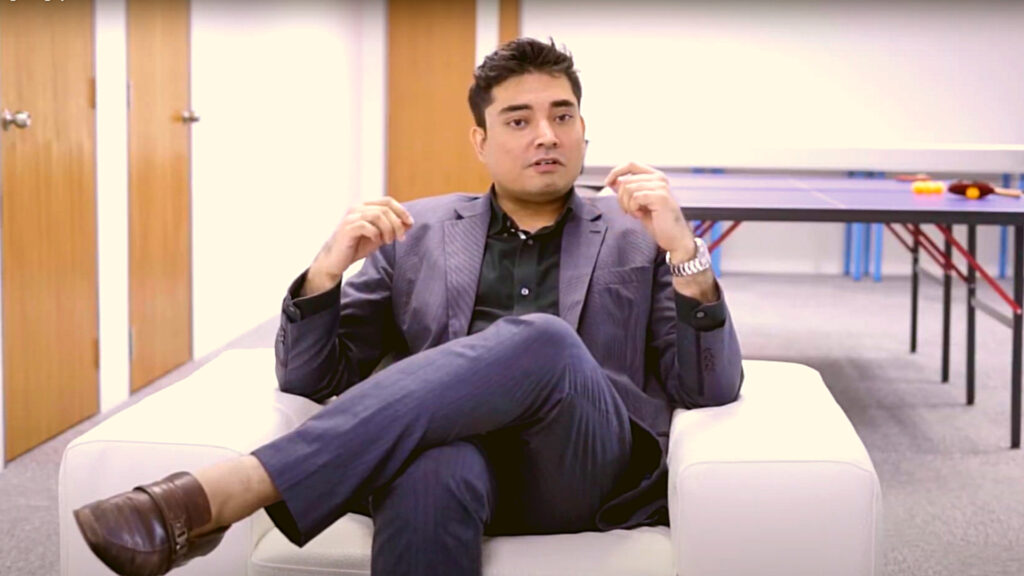Sancy Suraj is a name that has become synonymous with exceptional memory skills. He has broken several records related to memory and has inspired countless people around the world to improve their own memory abilities. One of his most impressive feats was memorizing Euler’s Number to 2,385 decimal places, which he accomplished in just over five hours. In this article, we will explore Suraj’s strategies for improving memory, the impact of his accomplishments, and his future plans for continuing to challenge himself and push the limits of his memory.

What do you think sets your memory skills apart from those of other people?
As someone who has been able to achieve exceptional memory feats, I believe that what sets me apart from others is my dedication and commitment to mastering memory techniques. I have spent countless hours studying and practicing various memory techniques, which has allowed me to develop an incredibly powerful memory.
One key strategy that Pinnacle Minds teaches for improving memory and retaining information over the long term is the use of mnemonic devices, such as the “memory palace” technique that I mentioned earlier. Another important strategy is to make sure that you are fully engaged and focused when learning new information. This means minimizing distractions and creating an environment that is conducive to learning.
Pinnacle Minds also emphasizes the importance of repetition and review when it comes to retaining information over the long term. By revisiting and reviewing material regularly, you can reinforce what you have learned and ensure that it stays fresh in your mind.
Finally, Pinnacle Minds teaches the importance of staying motivated and having a growth mindset when it comes to learning and memory. It’s easy to become discouraged or feel like you are not making progress, but by staying motivated and embracing challenges, you can continue to push yourself and achieve incredible feats.
Overall, what sets me apart from others when it comes to memory skills is my passion and dedication to mastering these techniques, as well as my ability to apply them in a way that allows me to achieve incredible memory feats. By following the strategies and techniques taught by Pinnacle Minds and staying committed to my training, I believe that anyone can improve their memory skills and achieve great things.
How do you approach the challenge of memorizing extremely large numbers, such as Euler’s number?
When it comes to memorizing extremely large numbers, such as Euler’s number, there are a number of strategies and techniques that I use to make the process easier and more efficient. One of the most important strategies is to break the number down into smaller, more manageable chunks. For example, with Euler’s number, I might divide it into groups of 10 or 20 digits, which makes it easier to remember each individual chunk.
Another key technique that I use is visualization. I associate each number with a specific image or object, which makes it easier to remember. For example, I might associate the number 1 with a candle, the number 2 with a swan, and so on. By creating vivid mental images for each number, I can more easily remember the sequence of digits.
In addition to these strategies, I also make use of mnemonic devices, such as the “memory palace” technique. With this technique, I associate each number with a specific location within a familiar environment, such as my home or a familiar street. By mentally walking through the environment and associating each number with a specific location, I can more easily recall the sequence of digits.
Finally, I make sure to practice regularly and review the material frequently. Memorizing large numbers requires a lot of repetition and reinforcement, so I make sure to revisit the material regularly and to test myself frequently to ensure that I am retaining the information.
Overall, the key to memorizing extremely large numbers is to break the number down into manageable chunks, to use visualization and mnemonic devices to make the information more memorable, and to practice regularly and review the material frequently to ensure that it stays fresh in your mind. By following these strategies and techniques, anyone can improve their ability to memorize large amounts of information.
Have you always been interested in mathematics and numbers, or is it something that developed later in life?
Growing up, I was always interested in numbers and mathematics, but I never thought of myself as having an exceptional memory. It wasn’t until I was in my early twenties that I discovered my natural talent for memorization. I had just started working as a tutor, and I found that I was able to memorize my students’ names and academic records after meeting them just once or twice. This sparked my interest in memory training, and I began researching and practicing various memory techniques.
As I continued to develop my memory skills, I found that I was able to apply them to many different areas of my life. I began memorizing historical facts and important dates, as well as the details of books and movies that I enjoyed. Eventually, I started taking on more challenging memory tasks, such as memorizing long strings of numbers like Euler’s number.
Today, my interest in mathematics and numbers has only grown stronger, and I continue to explore new ways to challenge and expand my memory skills. Whether it’s memorizing pi to hundreds or thousands of digits, or mastering the flags of every country in the world, I am constantly pushing myself to new limits and discovering new ways to apply my memory skills in exciting and meaningful ways.
“Discovering a natural talent for memorization can open up a whole new world of possibilities and opportunities. With dedication and practice, even those who never considered themselves to have exceptional memory skills can develop and expand their abilities in surprising and rewarding ways.”
How do you think your memory skills could be useful in other areas of research or academia?
I believe that memory skills can be incredibly useful in many different areas of research and academia. For example, in the field of medicine, having a strong memory can be essential for memorizing complex medical terms and remembering important details about patient histories and treatments. In the field of law, a strong memory can be critical for remembering legal precedents and case details, as well as for delivering effective courtroom arguments.
In addition to these practical applications, I believe that memory skills can also be invaluable for academic research and study. Whether it’s memorizing long lists of research findings and statistics, or remembering the details of complex scientific theories and equations, a strong memory can make it easier to learn and understand complex material and can help researchers to make connections and draw conclusions that might otherwise be missed.
Overall, I believe that memory skills are a powerful tool that can help individuals to succeed in many different areas of research and academia and that investing in memory training and development can be a smart and worthwhile investment for anyone looking to excel in their field.
What role do you think memory plays in overall intelligence or cognitive ability?
Memory is an essential component of overall intelligence and cognitive ability, as it plays a critical role in both the acquisition and retrieval of information. Without a strong memory, it can be difficult to learn and retain new information and to make connections between different concepts and ideas.
At the same time, memory is also closely linked to other cognitive abilities, such as attention, focus, and problem-solving. By improving our memory skills, we can also improve our ability to concentrate, analyze information, and solve complex problems.
Overall, I believe that memory plays a critical role in overall cognitive ability and that investing in memory training and development can be an effective way to enhance our overall intelligence and ability to succeed in many different areas of our lives. By using memory techniques and strategies to improve our ability to learn and retain information, we can set ourselves up for success in both our personal and professional lives, and achieve our full potential as individuals.
“Memory is not only a fundamental component of intelligence, but it also serves as a gateway to enhancing other cognitive abilities such as attention, focus, and problem-solving. By prioritizing memory training and development, we can improve our overall cognitive abilities and achieve greater success in all areas of our lives.”
Suraj attributes his incredible memory skills to the memory techniques he has learned and refined over the years. As the co-founder of Pinnacle Minds, he teaches these strategies to others, helping them to improve their memory and retain information over the long term. Some of the key techniques that Pinnacle Minds teaches include the use of mnemonic devices, visualization, and association.
Suraj’s memory skills have earned him the title of “memory marvel,” and his accomplishments have had a significant impact on his personal and professional life. He has received positive feedback from family, friends, and colleagues, and his record-breaking feats have garnered him a considerable amount of media attention. Suraj has used his platform and visibility to continue to promote the importance of memory skills and to inspire others to challenge themselves.
In addition to his accomplishments in memory, Suraj has also pursued other areas of research and academia, recognizing the benefits that memory skills can have in these fields. He plans to continue to challenge himself and push the limits of his memory in the future, using his platform and visibility to promote the importance of memory skills and inspire others to improve their own memory abilities.

Have you ever encountered a number or mathematical concept that you were unable to memorize or understand?
As someone who is passionate about numbers and mathematics, I have certainly come across complex concepts and numbers that were challenging to memorize and understand. However, I believe that there is no such thing as an impossible number or mathematical concept to understand or memorize with the right approach and mindset.
For instance, when I was first introduced to Euler’s number, I initially found it to be quite intimidating, given that it is an irrational number that continues infinitely without repeating. However, with the right techniques and a lot of practice, I was eventually able to memorize it with ease. Similarly, when I was first learning calculus, I found it to be quite difficult to understand, but with the right guidance and a lot of practice, I was eventually able to grasp the concepts and become proficient in the subject.
In my experience, the key to successfully memorizing and understanding complex numbers and concepts is to break them down into smaller, more manageable parts, and to use visualization techniques to create mental images that help to reinforce the information. Additionally, it is important to approach the learning process with a growth mindset and to be persistent and determined in the face of challenges.
How do you maintain your focus and concentration during long periods of memorization or studying?
Maintaining focus and concentration during long periods of memorization or studying can certainly be a challenge, but there are a few techniques that I use to help stay focused and productive. Firstly, I find it helpful to break up my study sessions into smaller, more manageable chunks, with regular breaks in between. This helps to prevent burnout and keeps my mind fresh and alert.
I also try to eliminate distractions as much as possible by working in a quiet environment and turning off my phone and other devices that may interrupt my focus. When I’m memorizing numbers, I find it helpful to use memory techniques such as the memory palace or the peg system, which help to create mental associations that make it easier to recall information.
Another important factor in maintaining focus and concentration is staying motivated and interested in the material that I am studying. By choosing subjects that I am passionate about and finding ways to make the material engaging and interesting, I am able to stay focused and motivated even during long study sessions.
What kind of tools or techniques do you use to aid in your memory retention?
There are a variety of tools and techniques that I use to aid in my memory retention, including visualization techniques, memory palaces, the peg system, and the Major System. Visualization techniques involve creating mental images that are associated with the information I am trying to memorize, which can help to reinforce the information and make it easier to recall.
The memory palace is another technique that involves creating a mental map of a familiar location, such as a house or a street, and associating each piece of information with a specific location on the map. The peg system is a technique that involves associating numbers with a series of pre-memorized images and then creating mental associations between those images and the information that needs to be memorized. Finally, the Major System involves converting numbers into consonant sounds, and then using those sounds to create words or phrases that are associated with the information being memorized.
In addition to these techniques, I also find it helpful to practice regularly and to stay motivated and engaged with the material that I am trying to memorize. Finally, staying organized and breaking up study sessions into manageable chunks can also help to the memory competitions, I also plan to continue working with Pinnacle Minds to help others develop their memory skills. We offer training programs and workshops that teach people how to improve their memory, focus, and overall cognitive abilities. I believe that everyone has the potential to develop a better memory, and I want to help as many people as possible unlock that potential.
Do you think your memory skills have any limitations or areas for improvement?
While Sancy Suraj’s memory skills are truly impressive, he recognizes that like any human being, his memory skills also have limitations and areas for improvement. For example, while he has been able to memorize large sets of numbers, he acknowledges that there are more complex mathematical concepts that might be more challenging for him to memorize.
Similarly, he acknowledges that while he has been able to memorize flags and their corresponding country names, other areas of geography such as maps and locations might pose a more significant challenge for him. To continue to improve his memory skills, Sancy continually challenges himself with new memory exercises and techniques.
He also pays close attention to his diet and exercise, recognizing the link between physical health and mental health. Moreover, he remains open to learning new techniques and strategies from other memory experts and mentors, understanding that there is always room for growth and improvement.
How do you plan to continue challenging yourself and pushing the limits of your memory in the future?
Sancy Suraj plans to continue challenging himself and pushing the limits of his memory in the future by setting new records and tackling new memory challenges. He acknowledges that there is still much to learn and discover about the human brain and memory, and he is excited to continue exploring the limits of his own abilities.
Sancy also recognizes the importance of sharing his knowledge and expertise with others, particularly younger generations. He plans to continue mentoring and teaching others about memory techniques and strategies, with the hope of inspiring a new generation of memory athletes and experts.
Finally, Sancy is also interested in exploring the ways in which memory techniques can be applied to other areas of life, such as education, business, and personal development. He believes that memory techniques have the potential to transform the way people learn, work, and live, and he is eager to explore new ways to apply these techniques in the future.
“Sancy Suraj’s passion for pushing the limits of his memory and sharing his knowledge with others is a testament to the power of memory training. By inspiring a new generation of memory experts and exploring the applications of memory techniques in various areas of life, he is paving the way for new innovations and breakthroughs in the field.”
Sancy Suraj’s accomplishments in memory have made him a role model for countless people around the world. His dedication to teaching others and promoting the importance of memory skills has made a significant impact in the fields of research and academia. As he continues to challenge himself and push the limits of his memory, Suraj serves as an inspiration for others to pursue their own passions and strive for excellence in their chosen fields.

























